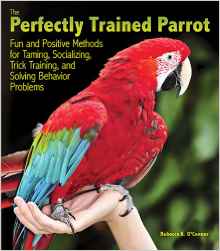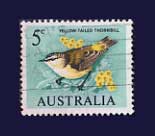
The Perfectly Trained Parrot
Rebecca O’Connor’s book explains how reward-based training works, and how it can be applied to parrots. This is a very useful book for people wanting to train their parrots to accept handling and health checks, as well as teach their parrot to talk. Rebecca O’Conor trains parrots for a living, so is able to give clear advice on teaching parrots to perform all kinds of feats, including fetching, and ‘playing dead’.
There’s no doubt that the methods in this book can help parrots and their owners to get on better. However, there are some limitations, which the book glosses over. The first relates to the needs of parrots, as social animals who are happier living with their own kind, and for foraging, and exploring the world with their beaks and tongues. The second relates to the abnormal behaviour of parrots raised away from their own kind, or which have spent long periods in isolation. Parrots are by nature social birds, so they do best living with other parrots. If they’re hormonal and screeching for a mate, tidbits may not be welcome. If they’re prevented from flying and foraging at dawn and dusk, when wild parrots are most active, they tend to get ‘antsy’ and frustrated.
Parrots raised by humans and kept alone can become very dependent on their human keepers for company. In some ways this book is helpful, in that it encourages owners to interact more with their birds. However, apart from a few species, such as cockatiels and budgies, which have been kept as pets over many generations, pet parrots aren’t really domesticated, they haven’t adapted to living with humans, but are wild creatures living in captivity. Their owners have an obligation to ensure that they’re able to express their natural behaviour as much as possible. Parrots treated as though they were naughty children, rather than intelligent creatures with species-specific needs, may become very frustrated. So, The Perfectly Trained Parrot is only likely to be useful in the hands of someone who is aware of parrots’ natural behaviour, and who plans training activities with that behaviour in mind.



